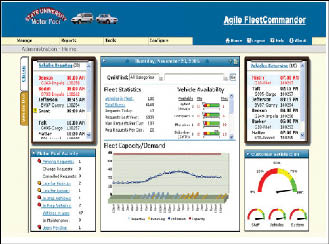Software programs that manage fleets of vehicles and associated operating costs have proved to be useful to governmental organizations and educational institutions. Recently, nonprofits with smaller fleets have begun to consider how these programs can help them run their pools of vehicles more efficiently.
These programs can be attached to fuel cards, which allow users to pay for gas quickly. Benefits include tracking fuel costs, managing tax exemptions, identifying vehicles that run more efficiently than others and even identify drivers who know how to operate a vehicle more economically than others. Other programs manage the actual assets of a fleet, allowing for greater vehicle sharing and, perhaps, fewer vehicles.
Target Audience
Companies that have vehicle fleets and want to run them with greater efficiency.
Overall Setup
The program is entirely Web-based. The company can tailor the interface to the organization’s needs.
Who Uses It
The program is used primarily by academic, corporate and government entities, but it has applications for youth-serving agencies that are concerned about higher fuel and maintenance costs. The smallest fleet using FleetCommander is composed of nine vehicles and 465 users.
Residential youth programs might find it particularly useful. Starr Commonwealth (www.starr.org), which runs residential programs at several sites in Michigan, is the first youth program user.
Specific Features
For managers: FleetCommander enables coordinators to organize their fleets scheduling so that the organization can use fewer vehicles. The program can help coordinators optimize their fleets by automatically assigning vehicles to drivers based on a set of criteria, such as highest-mileage vehicle being assigned last, or the oldest vehicles being assigned first. Coordinators can designate high-mileage vehicles for shorter trips, or they can schedule vehicles to make several trips in a day. Coordinators can also manually schedule vehicles with drivers.
Dashboard: The dashboard puts all of the controls in the hands of the coordinator. The interface is graphically appealing and presents a variety of information in five windows. Two windows list the vehicles departing and returning, with the name of the driver and the expected time; one lists motor pool activity. One window tracks user satisfaction on what looks like an RPM gauge. Another displays statistics, such as vehicle availability. There is also a chart that indicates the times of day when vehicles most frequently leave or return and highlights in red the times the fleet is being fully utilized.
For drivers: New drivers can apply and be approved by a coordinator, via an online form. Drivers can then reserve a vehicle with another online request form. Drivers can also electronically update their mileage.
Policy enforcement: FleetCommander helps coordinators enforce policies, which can help reduce costs and risks. For instance, if a vehicle requires a driver who has a commercial driver’s license, the system will not allow drivers to be assigned that vehicle unless they have that license on file.
Fuel transactions: Some of the data is provided by the company’s fuel cards, which are corporate credit cards that are used to purchase fuel and track its use. Since many fuel card programs require users to input the mileage of the car each time gas is purchased, the transaction files attached to fuel cards have a wealth of data about the fuel economy of a specific driver or vehicle. Coordinators can upload data from the organization’s fueling cards and closely monitor fuel costs. Costs and usage can be reported according to vehicle, driver or date range. Agile Fleet Systems, the company that produces FleetCommander, will work to make sure that the fields in the transaction file match the database.
User Friendliness
The dashboard control puts all the information for coordinators in one place. The screen that handles vehicle requests for drivers is easy to understand and simple to use. The system is very responsive to an organization’s needs.
Sampling
Screenshots of the software can be viewed on the company website.
Also of note …
Voyager Fleet Card and Fleet Commander Online
U.S. Bank’s Voyager Fleet Systems
http://www.fleetcommanderonline.com
This is a card-based approach to fuel and data management. It is accepted at over 230,000 fueling locations, which can be found via an online database. Each account can be configured to have cards for each driver, vehicle or organization. Tax exemptions can also be calculated and managed within the program, as can discounts negotiated with vendors.
When fueling, drivers can be required to enter a PIN or an odometer reading. Fueling limits can also be specified by number of transactions for a period of time or a fixed dollar amount.
Reporting can help organizations to identify inefficient vehicles or drivers, as well as to determine tax exemptions for operating costs.
Value-added services available include access to roadside assistance, glass repair and temporary replacement vehicles.
































